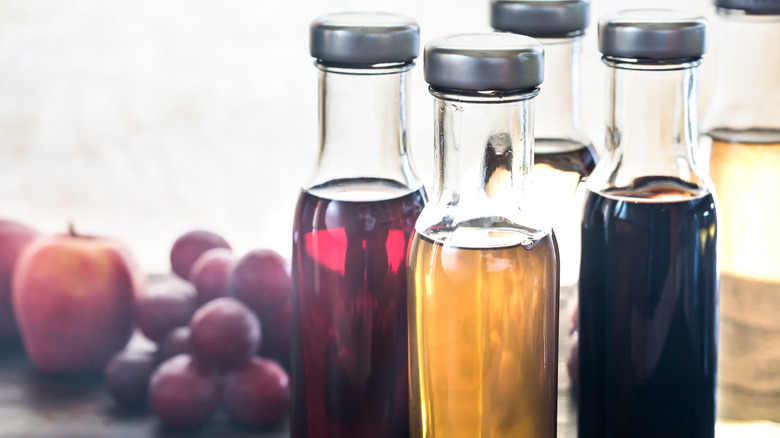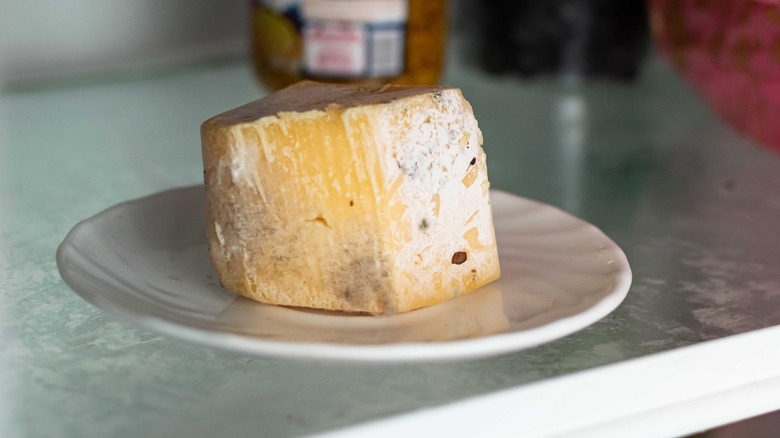Keep Your Cheese As Fresh As Possible With This Simple Vinegar Hack
Hard cheese has a longer shelf life than other perishable foods and keeps well in the refrigerator. Once opened, it should last for three to four weeks in the fridge, depending on the storage conditions. The downside is that excess moisture, temperature fluctuations, and other factors — such as storing cheese in plastic wrap – can promote mold growth. Luckily, you can prevent this from happening with a vinegar-dampened cheesecloth.
According to a TikTok video posted by Imperfect Foods, wrapping the cheese in a cloth or paper towel soaked in vinegar will keep mold at bay. The food delivery company also recommends placing your cheese in an airtight container before storing it in the fridge. Acetic acid, the active compound in vinegar, has antifungal and antibacterial properties, notes a 2020 study published by the BMC. That's why it makes a good cleaning agent, disinfectant, and preservative.
The vinegar hack works best for harder cheeses, which have a firm texture due to their low moisture content. Soft and semi-soft cheeses have a delicate texture, and wrapping them in a cloth soaked in vinegar can introduce additional moisture. This may affect their consistency, causing them to become mushy. That's not the case with cheddar, gouda, parmesan, Monterey Jack, and other hard or semi-hard cheeses.
How to use vinegar to keep cheese from molding
Vinegar can do some pretty surprising things around the house, from repelling insects to reviving wilted vegetables. It's also an effective preservative due to its high acidity and antifungal properties. Mold thrives in environments with a pH level of 5.0 to 6.0, whereas most types of vinegar have a pH level of 2.0 to 3.4. Vinegar's high acidity inhibits mold growth, keeping food fresh for longer. That's why this pantry staple is used for pickling cabbage, cucumbers, radishes, or even fruits.
@imperfectfoods No more moldy cheese! #themoreyouknow
With that in mind, pour a small amount of vinegar into a bowl. Next, soak a cheesecloth or paper towel in it and squeeze out the excess moisture. Or you can simply pour vinegar directly onto the cloth and then squeeze it. Wrap your cheese in the cloth, place it in a food container, and store it in the refrigerator. Check it once a week or so to make sure the cloth is still moist. If it has dried out, dampen it with vinegar and re-wrap it around the cheese.
Vinegar can save moldy cheese, too
The U.S. Department of Agriculture says it's safe to eat hard cheeses that grow mold if you cut off the affected area. Their firm texture prevents mold from penetrating the surface. Therefore, you can simply remove the moldy spots and wrap the remaining cheese in a cloth dampened with vinegar. This should prevent new mold growth and keep your cheese fresh for longer.
Note: moldy soft cheeses are not safe to eat. Their high moisture content allows bacteria and fungi to spread beyond the surface, which may pose health risks. The same goes for shredded or sliced cheese. An exception is the mold added during the production process. Not only is it edible, but it also enhances the cheese's flavor and texture. However, these cheese varieties can also grow mold due to spoilage. In such cases, cut off the problem area and refrigerate the rest. Use the vinegar method to preserve gorgonzola, Stilton, blue cheddar, and other hard or semi-hard cheeses made with mold.


